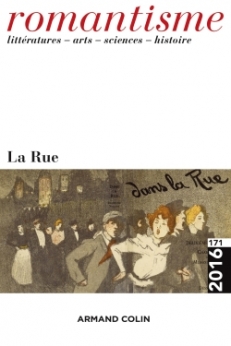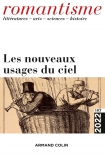
Romantisme n° 171 (1/2016)
Pour acheter ce numéro, contactez-nous
Recevez les numéros de l'année en cours et accédez à l'intégralité des articles en ligne.
Afin de parachever l’unification du territoire agrandi de Paris en 1860, une commission administrative dont le rapporteur est Charles Merruau, secrétaire de la préfecture, est chargée en 1862 de mettre de l’ordre dans les dénominations de rues. Dans une vision surplombante et d’édilité, celle-ci commence par revoir les termes génériques des voies et poursuit en faisant des propositions. En ce sens, elle affirme l’impérialisation des rues de la capitale et l’histoire « glorieuse et légendaire » à laquelle l’Empire lui-même souhaite se rattacher. L’avènement de la République va initier une campagne de débaptisation, menée par le conseil municipal en conflit avec le préfet, écartant les référents les plus évidents à la famille impériale et confirmant un éclectisme qui sera maintenu.
In 1862, in order to give the finishing touches to the unification of the territory of Paris, enlarged in 1860, an administrative commission headed by Charles Merruau, secretary of the prefecture, was put in charge of giving a semblance of order and organization to the city’s street names. With a top-down point of view committed to celebrating city worthies, the commission started out by reviewing the generic names of all passageways and went on to make propositions. In this way, it asserted both the “Empirisation” of the capital’s streets and the “glorious and legendary” history with which the Second Empire wished to identify. The establishment of the Third Republic was to instate a round of “debaptism”, led by the town council in conflict with the Prefect, putting aside the most flagrant allusions to the imperial family and confirming an eclecticism which was to endure.

